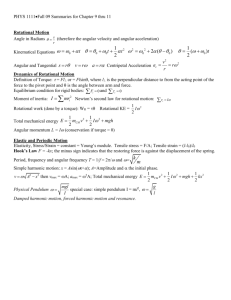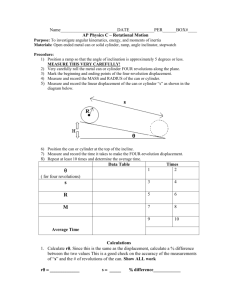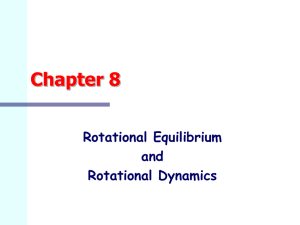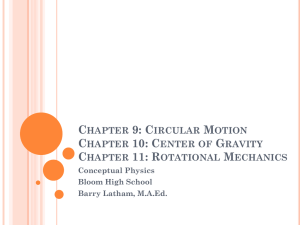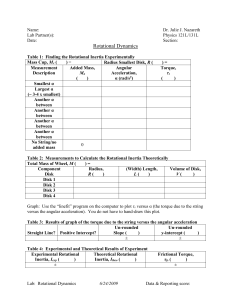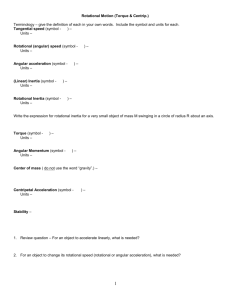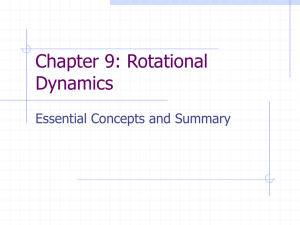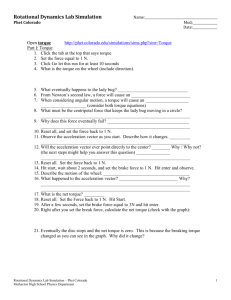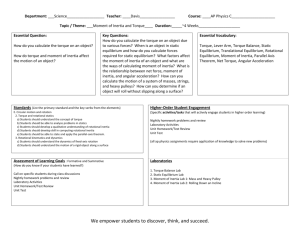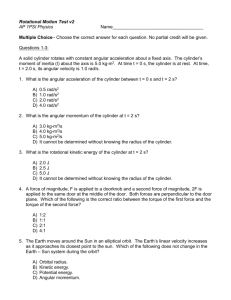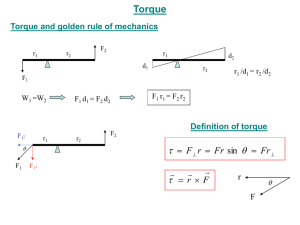Rotational dynamics
advertisement
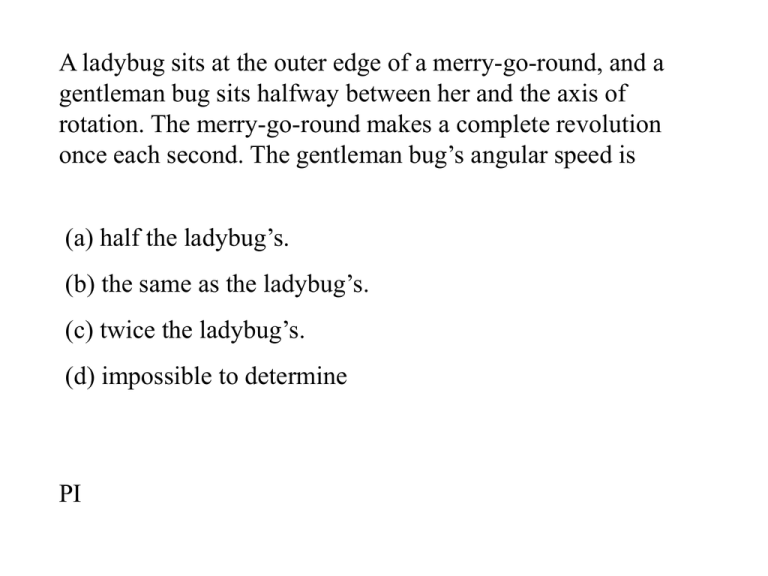
A ladybug sits at the outer edge of a merry-go-round, and a gentleman bug sits halfway between her and the axis of rotation. The merry-go-round makes a complete revolution once each second. The gentleman bug’s angular speed is (a) half the ladybug’s. (b) the same as the ladybug’s. (c) twice the ladybug’s. (d) impossible to determine PI Vector direction of rotational quantities If a body is rotating, its direction of motion is constantly changing so cannot be represented by a single vector in the plane of rotation. However, we can use a single vector to give the direction of a rotational quantity (e.g angular velocity ,angular acceleration and angular displacement ) using the following convention: a) Curl the fingers of the right hand so that they point in the direction in which the rotational quantity is positive b) With the thumb at right angles to the plane of the fingers, it points in the vector direction of the quantity. Or A right-hand screw, when rotated in the sense of the rotational quantity, will advance in the direction of the vector A wheel is rotating as shown on the right and slowing down. Given the vector directions (out) a) b) (in) c) I) Which best represents direction of the angular velocity? II) Which best represents the direction of the angular acceleration? d) For the following vectors A , B , C and D , which are the correct vector directions for A B and C D ? C x D (into page) A B (a) (a) (b) (b) (c) • (out of page) (d) x (into page) (e) None of the above. (c) (d) • (out of page) (C) (e) None of the above. Rank the following in order of decreasing torque. (ii) (i) Force (iii) (iv) a) i>ii>iii>iv d) iv>iii>i>ii b) iii>iv>ii>i e) iv>iii>ii>i c) iii~iv>ii>i For this wrench, with applied force F, which is the best answer below for the torque? r F a) F r b) r F c) r F d) rF sin e) b) and d) Which of the following is (are) correct expression(s) for the torque? (a) r F (b) F r (c) I (d) r (e) (a) and (c) You are trying to open a door that is stuck by pulling on the doorknob in a direction perpendicular to the door. If you instead tie a rope to the doorknob and then pull with the same force and in the same direction, is the torque you exert increased? (a) yes (b) no Which of the following objects has the largest moment of inertia about the point O ? r/2 2m O r O #1 m #2 a) #1 b) #2 c) the moment of inertia is the same for both The moment of inertia of a body rotating about an axis P-P is given by Ip mr i i 2 m r m2r2 m3r3 2 11 2 2 i The following objects have the same mass and radius. Which has the largest moment of inertia? P Solid disk (a) Solid disk (b) Hollow disk (c) Solid sphere (d) All the same P Hollow disk P Solid sphere There is a correspondence between variables for translational and rotational motion. Which are the missing variables “_” in the expressions below? (a) (b) T transl’n Force K. En. Work Power F ma (c) " rotat’n P Fv _ K 21 mv 2 K W Fs (d) I 1 2 I _2 W _ P _ (e) J A box, with its center-of-mass off-center as indicated by the dot, is placed on an inclined plane. In which of the four orientations shown, if any, does the box tip over? A force F is applied to a dumbbell for a time interval )t, first as in (I) and then as in (II). In which case does the dumbbell acquire the greater energy? F F (I) a) (I) b) (II) c) no difference d) The answer depends on the rotational inertia of the dumbbell. PI (II) A force F is applied to a dumbbell for a time interval )t, first as in (I) and then as in (II). In which case does the dumbbell acquire the greater center-of-mass speed? F F (I) a) (I) b) (II) c) no difference d) The answer depends on the rotational inertia of the dumbbell. PI (II) Which of the following best represents the FBD of the beam on the right? T T a) b) m2 m1 Cy m1 g Cx m2 g Cx m2 g m1 g Cy T c) Cx T d) Cy m2 g m1 g e) None of the above Cy Cx m1 g m2 g pin hinge T For the situation given on the previous slide, the FBD of the beam is Q m2 g P m1 g torque reference direction Cx Cy Which of the forces Cx, Cy,m1g, m2g, T produce positive torques about I) Point P? II) Point Q? Answer (a) for yes and (b) for no For the situation given on the previous slide, the FBD of the beam is shown on the right. The beam is of length l and the angle between the beam and the horizontal is T Q m2 g P m1 g Cx Cy The torque produced by m1 about point P is a)m1 gl b)m1 g cosl c)m1 g sinl d ) zero The torque produced by m1 about point Q is a)m1 gl b)m1 g cosl c)m1 g sinl d ) zero t - torque reference direction What is the direction of the angular momentum about the points P, Q, R for a billiard ball (looking down on the table) Recall: L r p P v Q R (a) (b) (c) (d) (e) Zero What is the direction of the angular momentum about the points P, Q, R for a rotating bicycle wheel (as seen from the side) Recall: L r p P Q R (a) (b) (c) (d) (e) Zero Which best represents the correct free body diagram for a roller coaster car on a frictionless track? v a) ma b) N N mg mg d) c) N mg e) none of the above N mg A solid cylinder rolls without slipping down an inclined plane as sketched on the right Which of the following best represents the free body diagram of the cylinder? a) b) d) None of the above c) M A solid cylinder rolls without slipping down the inclined plane shown on the right R h How can you calculate its velocity at the bottom? (a) Use conservation of energy . (b) Use dynamics: I (c) Either (a) or (b) . (d) None of the above. and F ma A solid cylinder rolls without slipping down the inclined plane shown on the right M R h If one uses conservation of energy to calculate the cylinder’s velocity at the bottom, what is the correct equation? (a) Mgh = ½ Mv2 (b) Mgh = ½ Mv2 + ½IT2 (c) Mgh = ½IT2 (d) Mgh = ½ Mv2 + ½IT2 + fk h/sin() (e) None of the above. A hollow sphere and a hollow cylinder of the same mass and radius are released from rest at the same height on a ramp. The thickness of the wall is the same for both. They roll without slipping. Which one reaches the bottom of the ramp first? Hint: Either draw a free-body diagram and determine the torque about the point of contact, or use conservation of energy. Cylinder Sphere (a) they both arrive at the same time (b) the sphere arrives first (c) the cylinder arrives first (d) not enough information to tell. Consider the mass-pulley system to the right. The string is wrapped around the pulley, which is free to rotate. Which of the following best represents the free body diagrams for the pulley and block? a) b) e) none of the above c) d) R M m Consider the mass-pulley system to the right. The string is wrapped around the pulley, which is free to rotate. R M m Which of the following is the correct equation of motion for the block? T is the tension in the string. (a) mg - T = ma (b) T - mg = ma (c) T - mg = 0 (d) None of the above
